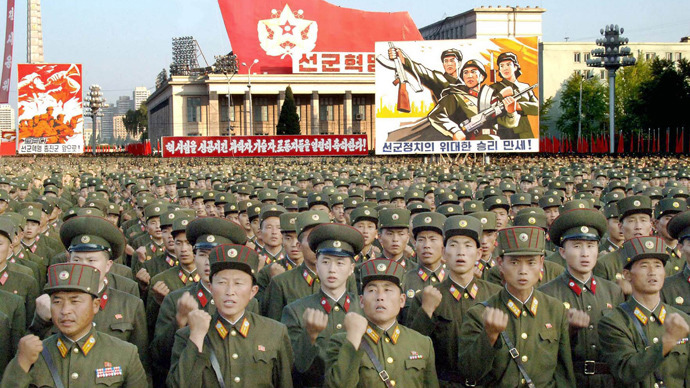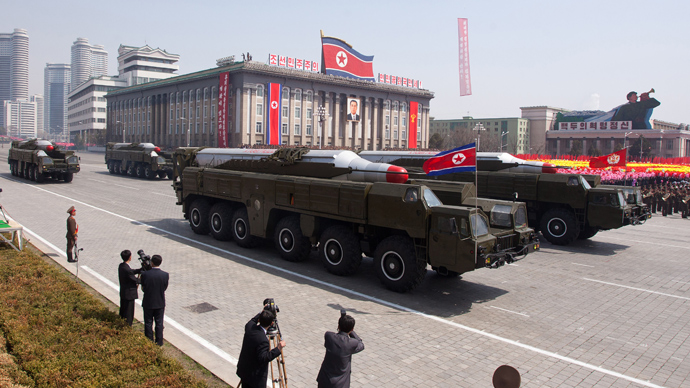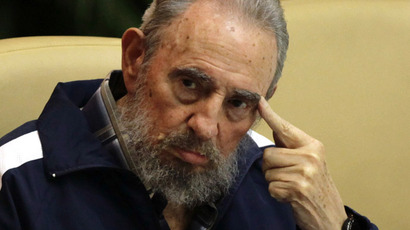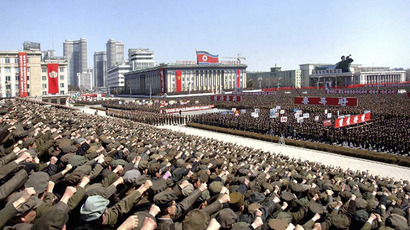Korean nuke conflict may make Chernobyl look like ‘fairytale’ – Putin

If a nuclear conflict erupts on the Korean Peninsula, Chernobyl would look like a “kids’ fairytale,” Russia’s president said. Tensions have been escalating rapidly, with last week seeing conflicting reports about North Korean nuclear activity.
Speaking at the annual industrial fair in Hannover, Vladimir
Putin compared the possible nuclear brawl between Seoul and
Pyongyang with one of the worst nuclear accidents in history - the
explosion at the Chernobyl Nuclear Power Plant.
According to Putin, the consequences of the nuclear conflict on the
Korean Peninsula would far exceed the industrial disaster in
Chernobyl.
The situation on the peninsula remains highly destabilized. On
Monday, South Korea said a new nuclear test by the North was ‘not
imminent’. However, the statement came shortly after Seoul had
accused Pyongyang of gearing up for its fourth nuclear test.
Also on Monday, South Korean Yonhap news agency reported that North
Korea is withdrawing its workers from the Kaesong industrial zone
shared with the South.
Earlier a South Korean government source talking to the country’s
Joongang Daily said that Pyongyang appeared to be making
preparations for another underground nuclear test at Punggye-ri,
the site of its previous test.
“We have detected increased activity of labor forces and vehicles at the southern tunnel of the test site in Punggye-ri, where the regime has worked on maintenance for facilities since its third nuclear test in February”, one of South’s top government officials said. He added that “the activities appear to be similar to those before the third test, so we are closely monitoring the site.”
The official went on to say that the South Korean government “were also tipped off that Pyongyang would soon carry out an additional nuclear test…but we are analyzing if it is indeed preparation for an additional test or it is just to pressure Seoul and Washington.”
The news came on the heels of the report by a top South Korean
security official that their northern neighbor could be gearing up
for a test-launch this week – just a day after the United States
had earlier delayed its own unrelated missile launch for fear of
provoking Pyongyang.
Chief national security adviser to South Korean President Park Geun-Hye said it was not yet clear if the launch would come before or after Wednesday, April 10, which is the date by which North Korea recommends any foreign diplomats leave its territory.

Foreign governments have already made clear, however, that they
do not plan to withdraw staff from North Korea just yet. The German
foreign minister has struck out at any suggestion that Pyongyang
could not guarantee in future the safety of foreign personnel on
its territory: "any deadline after which North Korea would no
longer ensure the security of embassies is unacceptable", the
German foreign ministry said.
British Foreign Secretary William Hague was among those who saw no current need for withdrawal of his country’s officials from North Korea.
There was, however, speculation of a possible provocation by Pyongyang, following an alleged loading of mid-range missiles onto mobile launchers and storing them away from prying eyes in facilities on the east coast. National Security Adviser Kim Jan-Soo said “there are no signs of a full-scale war as of now, but the North will have to prepare for retaliation in case of any local war.”
Chinese President Xi Jinping said on Sunday that it is unacceptable for any country to be stoking up tensions that could put an entire world region at risk. While it is North Korea’s major ally, it has been getting more assertive with statements on the international scene. The Chinese foreign ministry has also said in a statement to UN Secretary-General Ban Ki-moon that it will not tolerate any “trouble-making on its doorstep.”
On the same day, Japan’s Jiji news agency reported that the country’s defense ministry might give the order to blast any missile that is heading in their direction out of the sky.
Many fear that these recent developments could lead to a misunderstanding that could evolve into full-scale war. This has led to US Defense Secretary Chuck Hagel postponing the ‘Minuteman 3’ missile test, due to fears that such actions “might be misconstrued by some as suggesting that we were intending to exacerbate the current crisis with North Korea.”
Similarly, Seoul and Washington have decided to put their next big US meeting on hold, reportedly in case Pyongyang chooses to escalate with a missile launch in the coming days, with the Seoul’s chief away.
In an effort to cool the tensions, US Secretary of State John Kerry will include Seoul, Beijing and Tokyo in his trip next week, in the hopes that diplomacy will give Pyongyang a chance to exit the crisis in a dignified manner.
The North has presently mobilized its Musudan missiles, believed to reach distances of 3,000 kilometers (1,860 miles), which could in theory be tweaked to fly 4,000km. That means Japan, South Korea and the US military bases in Guam could be potential targets.

Tensions are now higher than they have been at any moment during this latest standoff, which followed Pyongyang’s third nuclear test in February, provoking international condemnation and a fresh round of UN Security Council sanctions, to which Pyongyang had replied with the threat of a nuclear strike on the US.
Last week, Pyongyang declared it had entered a state of war with its southern neighbor, following an earlier decision to withdrawal from the 60-year armistice that ended the Korean War. North Korea had previously threatened to pull out of the 1953 armistice if the South did not halt a joint annual military exercise with the US.
Most of the North Korean statements are conditional, talking
about retaliation attack rather than an assault, Tim Beal, an Asia
expert who specializes in North Korea, told RT.
“If you attack us with conventional weapons, then since we are
weak the only thing we can do is to attack with nuclear
weapons,” he explained Pyongyang’s position.
Beal said that North Korea is really concerned with US military
drills in the region, fearing the aggression.
“There is a real fear in Pyongyang that one of these days
Americans will actually [attack North Korea]. These are exercises
because they`ve got purpose,” he asserted.














